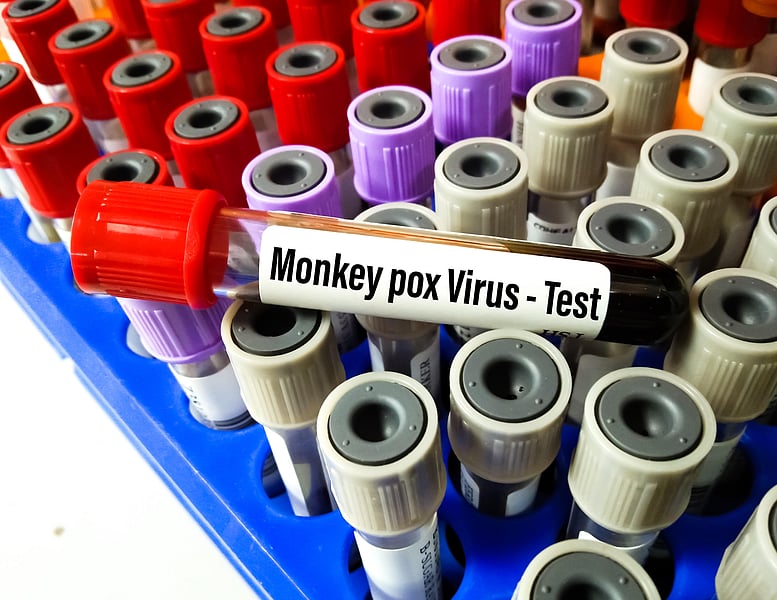Patient Resources
Get Healthy!
As Monkeypox Cases Spike, U.S. Orders More Vaccine, Boosts Testing
- July 15, 2022
- Dennis Thompson and Robin Foster
- HealthDay Reporter

With monkeypox cases continuing to climb in the United States, federal health officials said Friday they have ordered another 2.5 million doses of monkeypox vaccine and boosted national testing capacity to respond to the outbreak.
The news comes not a moment too soon, as demand for the vaccine outstrips supply and clinics in some American cities run out of supplies almost as soon as they arrive. In New York City, the demand for vaccine appointments was so high this week that the city's appointment system crashed on Thursday.
As of July 14, 1,470 cases of monkeypox have been identified in 44 jurisdictions in the United States, and that number will keep rising, officials said. The majority of cases are occurring among gay and bisexual men.
"With our current strategy recommending vaccination for those with known or suspected monkeypox exposures in the past two weeks, I want to acknowledge that at this time the demand for vaccines from jurisdictions is higher than our current available supply. And we know that this is frustrating," Dr. Rochelle Walensky, director of the U.S. Centers for Disease Control and Prevention, said during a Friday media briefing.
"We are working around the clock to increase supply and make sure we're reaching those most at risk. And I'm pleased to share that we're making a lot of progress," Dawn O'Connell, assistant secretary for preparedness and response at the U.S. Department of Health and Human Services, said during the briefing.
"In summary, we have purchased nearly 7 million doses of Jynneos [monkeypox vaccine]. We have received approximately 372,000 of those doses. And as of yesterday, we have delivered approximately 156,000 doses to states and jurisdictions, with the additional doses available today for ordering," O'Connell said.
"While the supply of Jynneos vaccine has been limited in recent weeks, we are starting to see supply increase and as it does we are going to continue getting those doses out as quickly, efficiently and equitably as possible," she said.
In addition to ordering more vaccines, the Biden administration is working to increase the availability of monkeypox testing nationwide by partnering with five commercial testing companies, according to an HHS news release. Since the outbreak began, testing capacity has increased to 70,000 per week -- up from 6,000.
But things could get worse before they get better.
"Now, as we closely monitor cases, I would like you to all understand that we anticipate an increase in cases in the coming weeks, and this is for three main reasons," Walensky said. "First, at CDC we have transitioned our case reporting to states to a much shorter, streamlined reporting form, which will make it quicker and easier for states to report cases in real time.
"Second, with more cases in the United States now, we expect to start to see the resulting exposure from these cases in the coming weeks," Walensky added. "We know monkeypox symptoms usually start within three weeks of exposure to the virus, so we anticipate we may see an increase in cases throughout the month of July and into August.
"And finally, we have significantly increased the number of people seeking laboratory tests and the number of specimens being submitted for testing. In fact, since July 6, our laboratory response network has seen a 76% increase in the number of tests," she said.
As for who should be tested, health officials say that anyone is susceptible to monkeypox, but most cases continue to be reported in gay and bisexual men. Scientists warn that anyone in close contact with someone who's contracted the disease or their clothing or bedsheets is at risk of contracting the virus, regardless of their sexual orientation.
Symptoms typically include fever, body aches, chills and fatigue. People who suffer from a more severe case may also develop a rash and lesions on the face and hands that may spread to other parts of the body, including the genitals.
Monkeypox is spread through direct contact with rashes, scabs or body fluids, according to the CDC. It can spread through kissing, sex and body contact. Exposure to unwashed laundry contaminated by the virus could also lead to infection, as could extended face-to-face contact with a sick individual.
More information
Visit the U.S. Centers for Disease Control and Prevention for more on the recent monkeypox outbreak.
SOURCES: July 15, 2022 media briefing with: Rochelle P. Walensky, MD, MPH, director, U.S. Centers for Disease Control and Prevention; Peter Marks, MD, PhD, director, Center for Biologics Evaluation and Research, U.S. Food and Drug Administration, and Dawn O'Connell, JD, assistant secretary, Preparedness and Response, U.S. Department of Health and Human Services; HHS news release, July 15, 2022

